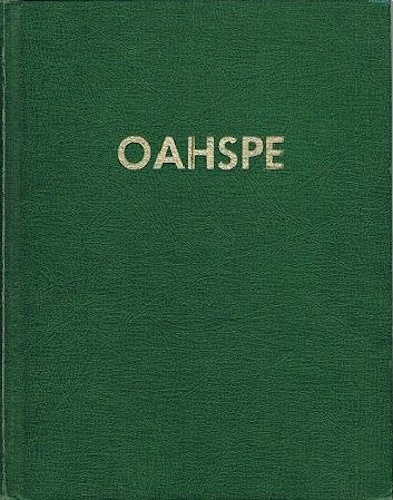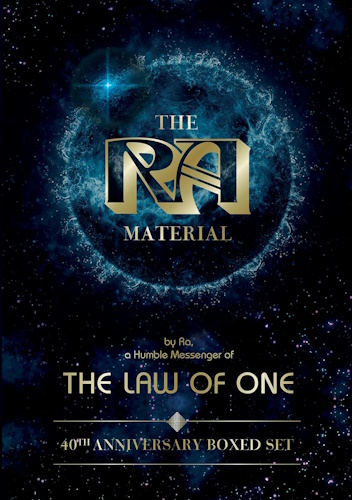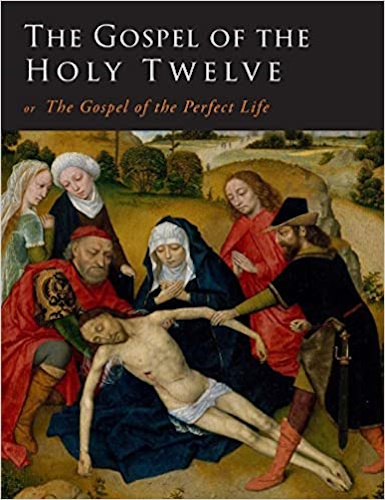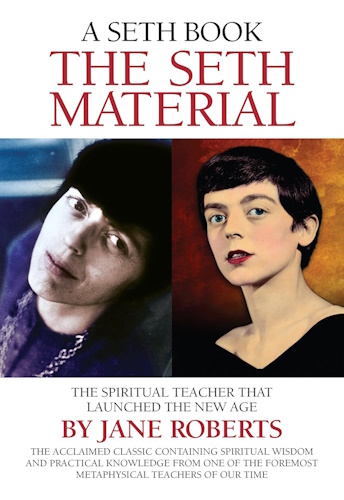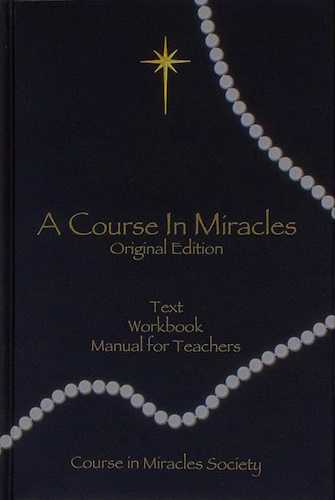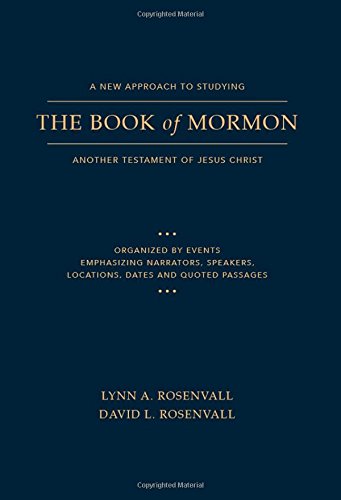
![]()
![]()
Book of God's Word
Chapter IV
1. WHEN So-qi, the king, issued the decree to have Zarathustra found and brought before him, otherwise all the male infants of Oas to be slain, the Lords sent travail on the king's wife and on the king's daughter, wife of Asha, the philosopher, and the two women gave birth that day to two sons, a month before their time, but nevertheless unto life and strength and beauty. Now, according to the laws of Oas, a king could not rescind or change his own decrees, for he had assumed the position of infallibility, whereupon he had doomed to death kin of his kin, flesh of his flesh.
2. Accordingly, after search had been made in vain to find Zarathustra, the king repented of his decree, but knew no way to justify a change of commandment. Asha, hearing of this, came out of concealment, saying to himself: Now will I go to the king and hold him to his decree, even demanding that he slay me also. So Asha came before So-qi, and after saluting, said: O king, I have heard of thy strait, and am come to thee that I may counsel thee.
3. The king was angered, and he said: Asha, my friend, hear thou thy king: Thou camest before me, relating a marvelous story regarding an infant son of the virgin who saith she never knew a man. Now, according to the laws of the City of the Sun, any man stating for truth that which he cannot prove, is already adjudged to death. Shall not the law be fulfilled, because, forsooth, thou art near me in blood?
4. Asha said: Most assuredly, O king, the laws must be carried out. Are they not the all highest? For it followeth that man being the all highest person, his laws, above all else, must never be set aside. Therefore, thou shalt have me slain. Think not I am come before thee to plead an excuse, in order to save myself; rather let all men perish than that the king's decrees go amiss.
5. The king said: Thou art wise, O Asha. The laws cannot err, for they are the standard by which to judge all else. And he who hath risen to be p. 180b king standeth by nature the infallible highest of all things. History hath proven this. But yet hear me, thou who hast wisdom from the movements of the sun and moon and stars: The king, being the all highest, how can he be bound? Cannot he decree new decrees forever?
6. Asha said: I will not deceive thee, O king! I know thou art arguing not for me, but for thine own infant son, and for thy daughter's infant son. Neither have I come before thee in prowess, though I love life. But here is the matter: If thou change one law, thou admittest that all laws made by man may also need changing; which is to say, wisdom is folly. How, then, shall the judge judge any man by the laws? Is it not setting up error in order to find truth?
7. The king said: Thou reasonest well. Methought this morning, in my walk in the market gardens, when the soldiers were spreading the scalps of their enemies in the sun to dry, whether or no, in ages to come, the weaker nations and tribes of men might not attempt to justify their right to life. And were the kings to admit fallibility in their decrees and laws, no man can foresee the end; for even slaves and servants and women will raise up against the laws, and claim their right to life. Wherein, then, would the earth be large enough for all the people? Yet, wherefore, O Asha, cometh this heart-ache of mine against killing mine own son?
8. Asha said: What are thy sympathies, O king? If thou wert to justify the escape of thy child's death for sympathy, would not my wife and my children justify their sympathy in desiring me to live? Nay, sympathy is the enemy of law and justice. It is the evil in our natures that crieth out for evil. The laws must be maintained; the decrees must be maintained; the king's word must be maintained. No man must suffer his judgment to go higher than the law, or the decree, or the king.
9. Asha said: This is the City of the Sun. If this city goeth back on its own laws, what will not the tributary cities do? Will not they also begin to disrespect the laws, or say: Perhaps the laws are in error? This will come to anarchy. To one purpose only can a great city be maintained. To divide the purposes and judgment of p. 181b men is to scatter to the four winds the glory of our civil liberty. Was it not disrespect of the laws, combined with superstition, that caused the nations of ancients to perish?
10. The king said: What shall I do, O Asha? My son hath smiled in my face!
11. Asha said: Thou shalt send me and thy son and thy daughter's son, and all male infants to the slaughter's pen, and have us all beheaded and cast into the fire. Otherwise, it will come true what the infant Zarathustra hath said: Behold, my hand shall smite the city of Oas, and it shall fall as a heap of straw.
12. Think not, O king, I am superstitious and fear such threats; but this I perceive: Suffer the laws to be impeached, and every man in Oas will set up to interpret the laws to be wrong and himself right. And thy officers will rebel against thee on all sides, and the glory of thy kingdom will perish.
13. After the city had been searched for thirty days, and the virgin and child not found, the king appointed a day for the slaughter, according to his former decree; and there were ninety thousand male infants adjudged to death, the king's son among the rest.
14. Whilst these matters were maturing, the Lord went to Choe'jon, and inspired him to make songs about Zarathustra, the infant that was stronger than a king. And also songs about the decree of death to the ninety thousand infant sons of Oas. And the beauty of the songs, together with the nature of these proceedings, caused the songs to be sung in the streets day and night; and the songs, in satire, approved of the horrors, so that even the king could not interdict the singing.
-
Urantia Book, 44:0.11 - The Celestial Artisans
Never in your long ascendancy will you lose the power to recognize your associates of former existences. Always, as you ascend inward in the scale of life, will you retain the ability to recognize and fraternize with the fellow beings of your previous and lower levels of experience. Each new translation or resurrection will add one more group of spirit beings to your vision range without in the least depriving you of the ability to recognize your friends and fellows of former estates.
-
Princess Bride 1987 Wallace Shawn (Vizzini) and Mandy Patinkin (Inigo Montoya)
Vizzini: HE DIDN'T FALL? INCONCEIVABLE.
Inigo Montoya: You keep using that word. I do not think it means what you think it means. -
Urantia Book, 117:4.14 - The Finite God
And here is mystery: The more closely man approaches God through love, the greater the reality -- actuality -- of that man. The more man withdraws from God, the more nearly he approaches nonreality -- cessation of existence. When man consecrates his will to the doing of the Father's will, when man gives God all that he has, then does God make that man more than he is.
-
Urantia Book, 167:7.4 - The Talk About Angels
"And do you not remember that I said to you once before that, if you had your spiritual eyes anointed, you would then see the heavens opened and behold the angels of God ascending and descending? It is by the ministry of the angels that one world may be kept in touch with other worlds, for have I not repeatedly told you that I have other sheep not of this fold?"
-
Urantia Book, Foreword - 0:12.12 - The Trinities
But we know that there dwells within the human mind a fragment of God, and that there sojourns with the human soul the Spirit of Truth; and we further know that these spirit forces conspire to enable material man to grasp the reality of spiritual values and to comprehend the philosophy of universe meanings. But even more certainly we know that these spirits of the Divine Presence are able to assist man in the spiritual appropriation of all truth contributory to the enhancement of the ever-progressing reality of personal religious experience—God-consciousness.
-
Urantia Book, 1:4.3 - The Mystery Of God
When you are through down here, when your course has been run in temporary form on earth, when your trial trip in the flesh is finished, when the dust that composes the mortal tabernacle "returns to the earth whence it came"; then, it is revealed, the indwelling "Spirit shall return to God who gave it." There sojourns within each moral being of this planet a fragment of God, a part and parcel of divinity. It is not yet yours by right of possession, but it is designedly intended to be one with you if you survive the mortal existence.
-
Urantia Book, 1:4.1 - The Mystery Of God
And the greatest of all the unfathomable mysteries of God is the phenomenon of the divine indwelling of mortal minds. The manner in which the Universal Father sojourns with the creatures of time is the most profound of all universe mysteries; the divine presence in the mind of man is the mystery of mysteries.
-
Urantia Book, 1:4.6 - The Mystery Of God
To every spirit being and to every mortal creature in every sphere and on every world of the universe of universes, the Universal Father reveals all of his gracious and divine self that can be discerned or comprehended by such spirit beings and by such mortal creatures. God is no respecter of persons, either spiritual or material. The divine presence which any child of the universe enjoys at any given moment is limited only by the capacity of such a creature to receive and to discern the spirit actualities of the supermaterial world.
-
Urantia Book, 11:0.1 - The Eternal Isle Of Paradise
Paradise is the eternal center of the universe of universes and the abiding place of the Universal Father, the Eternal Son, the Infinite Spirit, and their divine co-ordinates and associates. This central Isle is the most gigantic organized body of cosmic reality in all the master universe. Paradise is a material sphere as well as a spiritual abode. All of the intelligent creation of the Universal Father is domiciled on material abodes; hence must the absolute controlling center also be material, literal. And again it should be reiterated that spirit things and spiritual beings are real.
-
Urantia Book, 50:6.4 - Planetary Culture
Culture presupposes quality of mind; culture cannot be enhanced unless mind is elevated. Superior intellect will seek a noble culture and find some way to attain such a goal. Inferior minds will spurn the highest culture even when presented to them ready-made.
-
Urantia Book, 54:1.6 - True And False Liberty
True liberty is the associate of genuine self-respect; false liberty is the consort of self-admiration. True liberty is the fruit of self-control; false liberty, the assumption of self-assertion. Self-control leads to altruistic service; self-admiration tends towards the exploitation of others for the selfish aggrandizement of such a mistaken individual as is willing to sacrifice righteous attainment for the sake of possessing unjust power over his fellow beings.
-
Urantia Book, 54:1.9 - True And False Liberty
How dare the self-willed creature encroach upon the rights of his fellows in the name of personal liberty when the Supreme Rulers of the universe stand back in merciful respect for these prerogatives of will and potentials of personality! No being, in the exercise of his supposed personal liberty, has a right to deprive any other being of those privileges of existence conferred by the Creators and duly respected by all their loyal associates, subordinates, and subjects.
-
Urantia Book, 54:1.8 - True And False Liberty
There is no error greater than that species of self-deception which leads intelligent beings to crave the exercise of power over other beings for the purpose of depriving these persons of their natural liberties. The golden rule of human fairness cries out against all such fraud, unfairness, selfishness, and unrighteousness.
